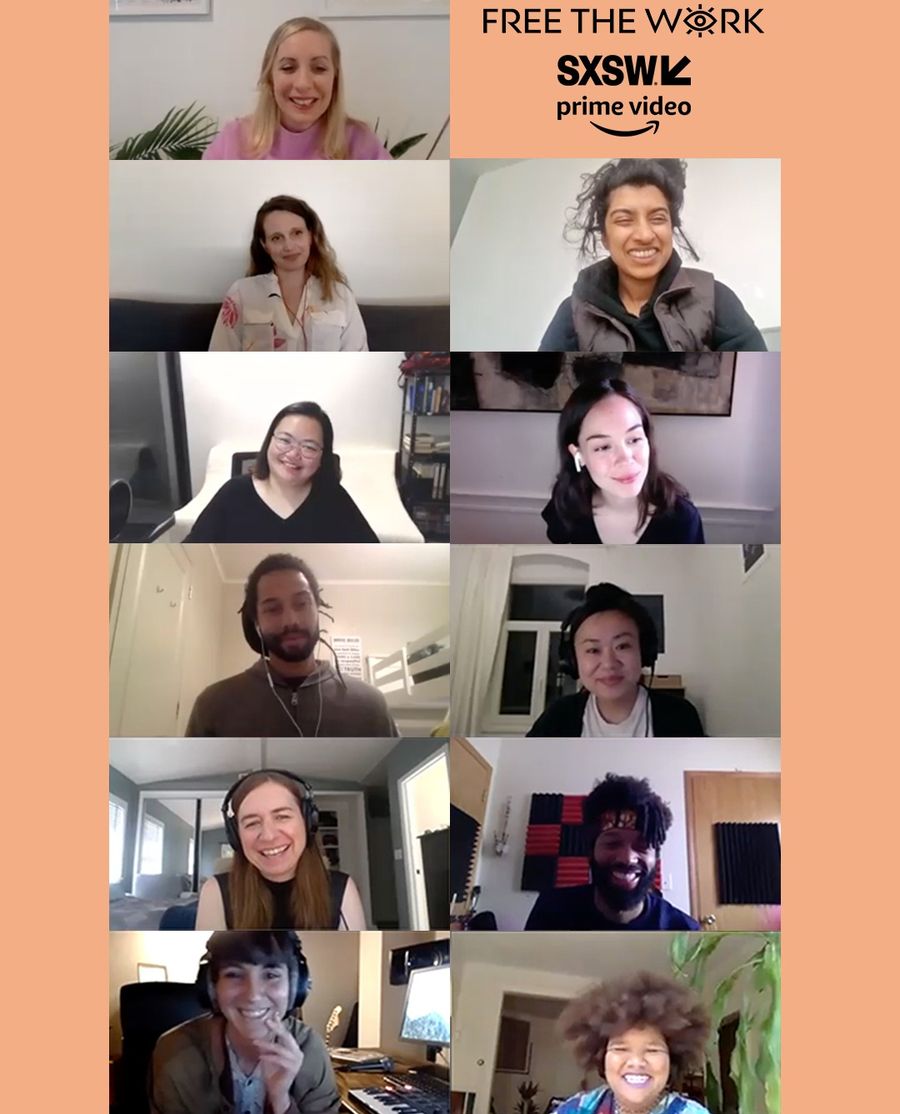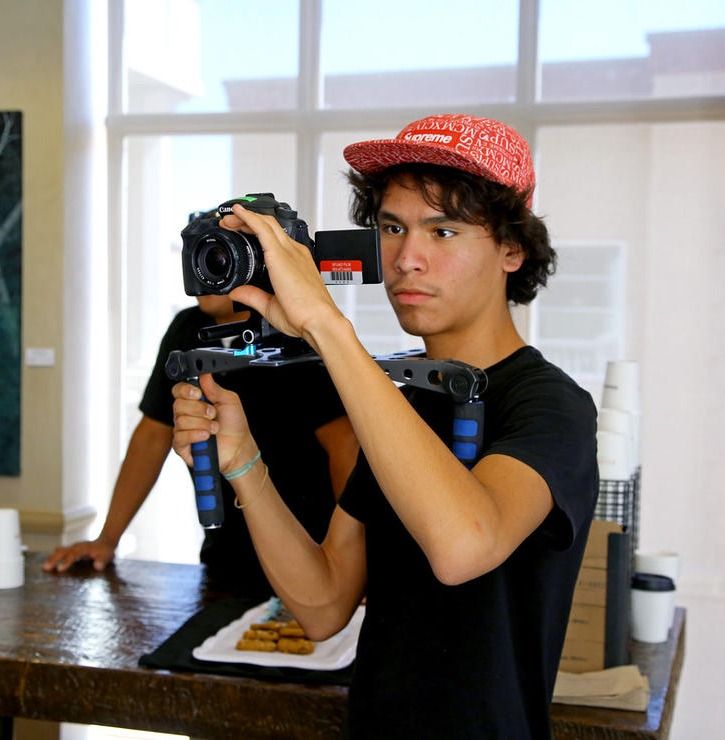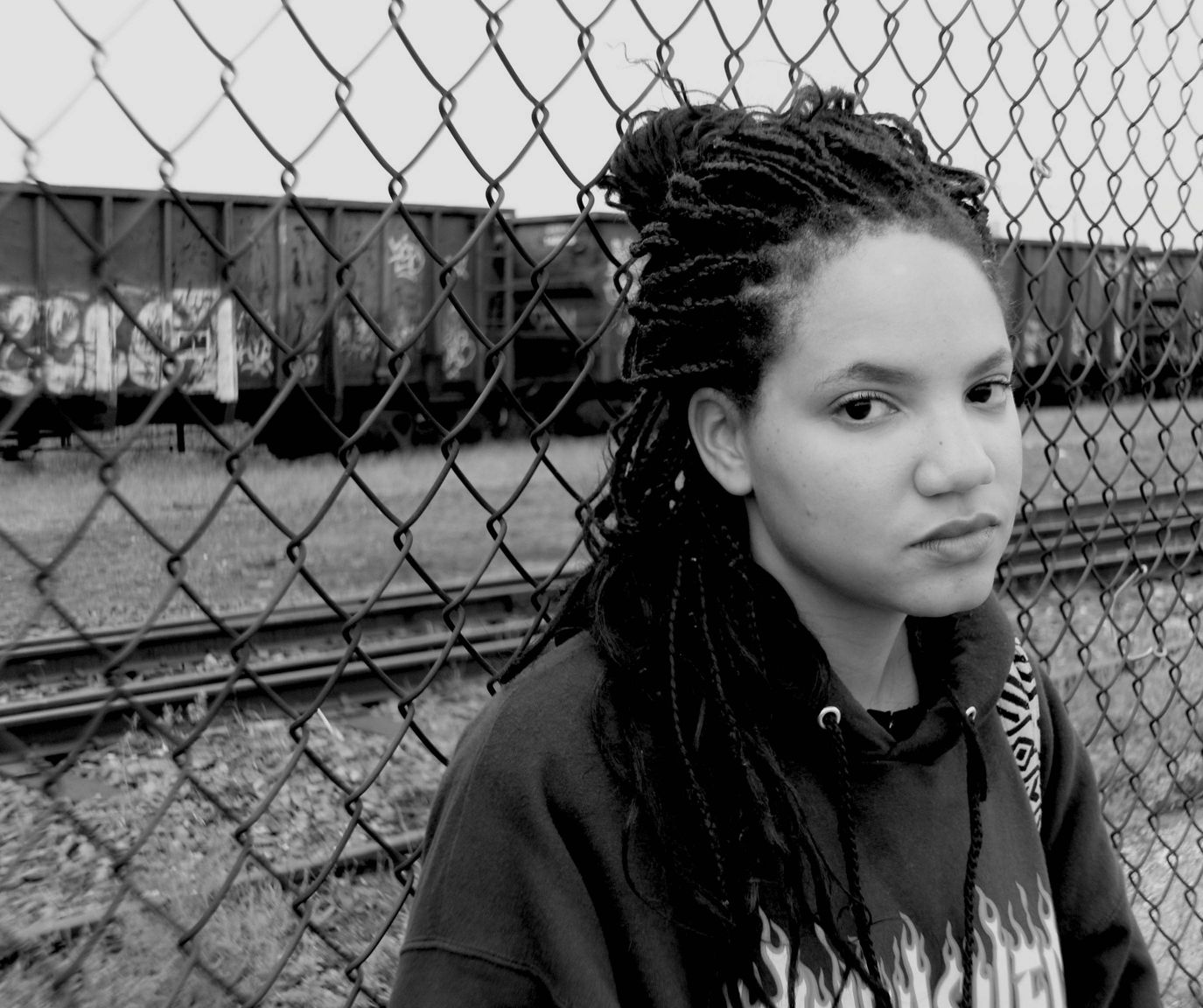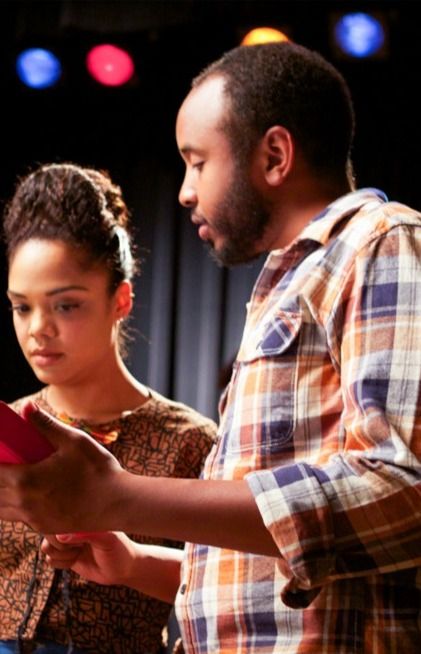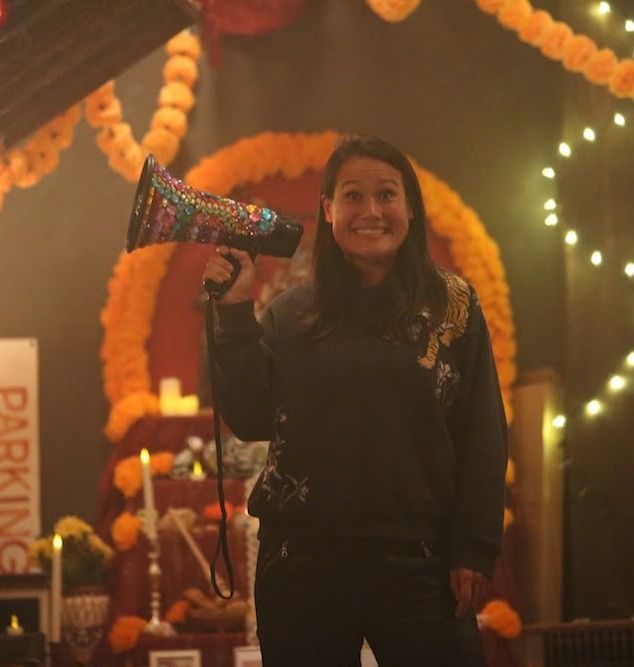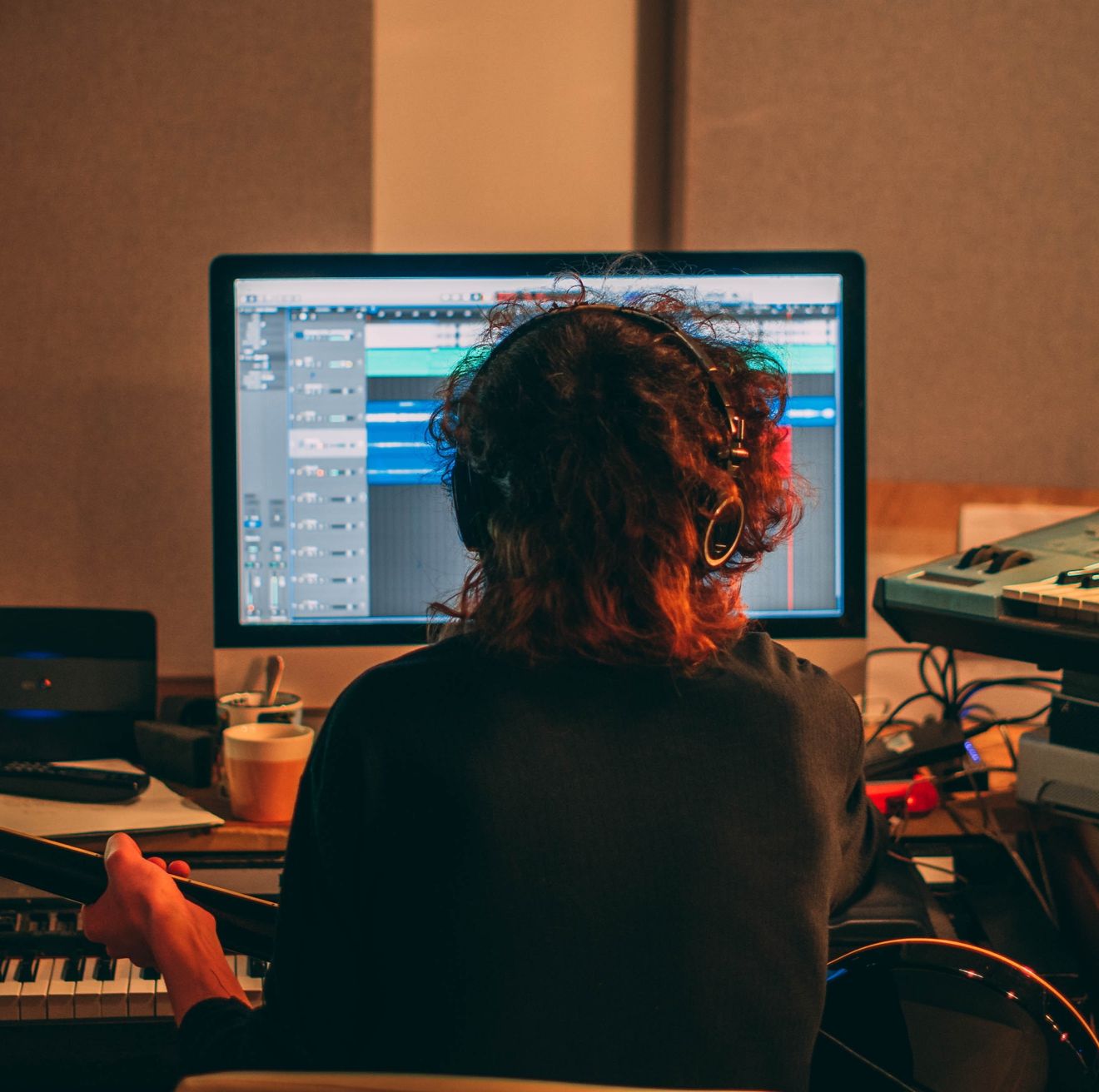In partnership with Amazon Prime Video and SXSW, FREE THE WORK is proud to present: "HOW I GOT HERE: The Roadmap to Creating Music for the Screen," a panel featuring ten talented composers who worked on this year's Amazon Prime Video x SXSW 2020 collection. Watch as Rebecca Grierson, Managing Director and Music Supervisor of SixtyFour Music, sits down with the following composers: Teresa Barrozo ("Reminiscences of the Green Revolution"), Tara Trudel ("Basic"), Midori Hirano ("Mizuko"), Sam Trump ("Hiplet: Because We Can"), Amyra Leon ("Broken Bird"), Ariel Marx ("Blocks"), Laura Heinzinger ("Call Center Blues"), Sonal Aggarwal ("A Period Piece"), Devon C. Johnson ("Face to Face Time"), and Paloma Peñarrubia (Gunpowder Heart).
Together, they discuss each of the composers' unique career paths, the battle to overcome impostor syndrome, and the process of getting opportunities in the industry. After watching the panel, be sure to stream all of their films through Amazon's SXSW Film Festival Collection, available now through May 6th.
Below are the panelists' bios and the full unedited transcription of the composer panel above. (Note: due to common technical interference, a few parts have been marked as inaudible or clarified).
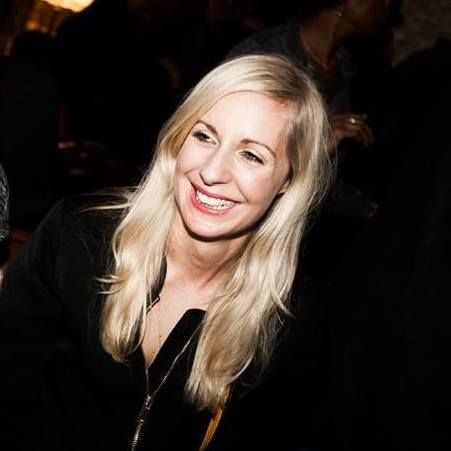
Rebecca Grierson
Panel Moderator
Rebecca Grierson is an award winning Music Supervisor and Managing Director of SixtyFour Music a British owned music house renowned for Oscar nominated feature films including "The Favourite." Rebecca launched SixtyFour Music in New York in 2017, growing the US team and supervising soundtracks for commercials, films and documentaries.
Rebecca has licensed music and supervised original scores for global brands and studios including 20th Century Fox, BBC, Vice, Google, Jaguar, Honda, Toyota, Johnnie Walker, Twitter, Billie, Nike, AMEX, NBC, AT&T and AMEX.
Rebecca is the Chairwoman on the East Coast Committee for the Guild of Music Supervisors. In 2018 Rebecca helped to set up and launch Free The Work’s Composer database.
Ariel Marx
Composer of "Blocks"
An eclectic composer and multi-instrumentalist, Ariel Marx draws from many genres and often combines orchestral and rare instruments with electronics to create unique worlds of sound. Her scores have premiered in films at Sundance, TIFF, SXSW, Tribeca, Woodstock, Criterion Channel, as well as Amazon, Netflix, and HBO.
Ariel is releasing a new album Luthier this coming summer, and is currently scoring an upcoming Netflix series, as well as Lindsay Gossling’s Thirteen Minutes (starring Paz Vega, Thora Birch Anne Heche and Amy Smart), Paul Shoulberg’s So Cold The River (starring Bethany Joy Lenz and Alysia Reiner). She recently completed limited series for Amazon — Ted Bundy: Falling For A Killer, SXSW’s Shiva Baby (directed by Emma Seligman and starring Rachel Sennot, Molly Gordon, Polly Draper, and Diana Agron), Matthew Balzer’s The Catch (starring Katia Winter , Bill Sage, James McMenamin, Kyle Gallner and Jere Burns). She recently completed the score for Ross Marks’ Walking With Herb (starring Edward JamesOlmos, George Lopez and Kathleen Quinlan) and co-composed the score for Edward James Olmos’ The Devil Has A Name, (starring David Strathairn, Kate Bosworth, Pablo Shreiber, Edward James Olmos, Alfred Molina, Martin Sheen, Haley Joel Osment, and Kate Asleton)
She also wrote the score for the Emmy-nominated, Golden Globe Nominated, and Independent Spirit Award nominated Sundance / HBO film The Tale, (directed by Jennifer Fox, and starring Laura Dern, Elizabeth Debicki, Jason Ritter, Ellen Burstyn, Common and John Heard ), the Independent Spirit Award nominated To Dust (directed by Shawn Snyder and starring Géza Röhrig and Matthew Broderick), which won the Best New Narrative Director and Narrative Audience Awards at the 2018 Tribeca Film Festival, Galt Niederhoffer’s 10 Things We Should Do Before We Break Up (starring Christina Ricci and Hamish Linklater) and Sarah Pirozek's #LIKE (starring Sarah Rich and Marc Menchacha).
Website: http://www.arielmarx.com/
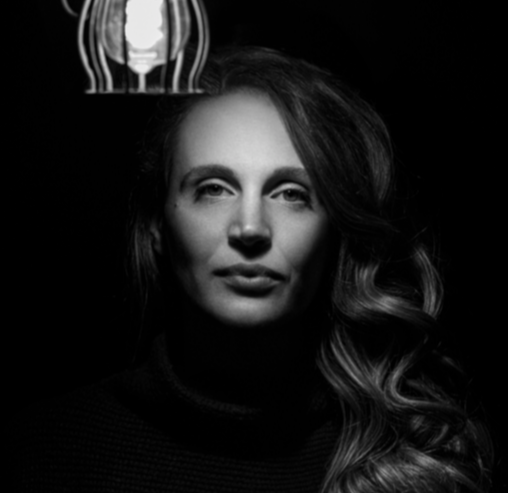
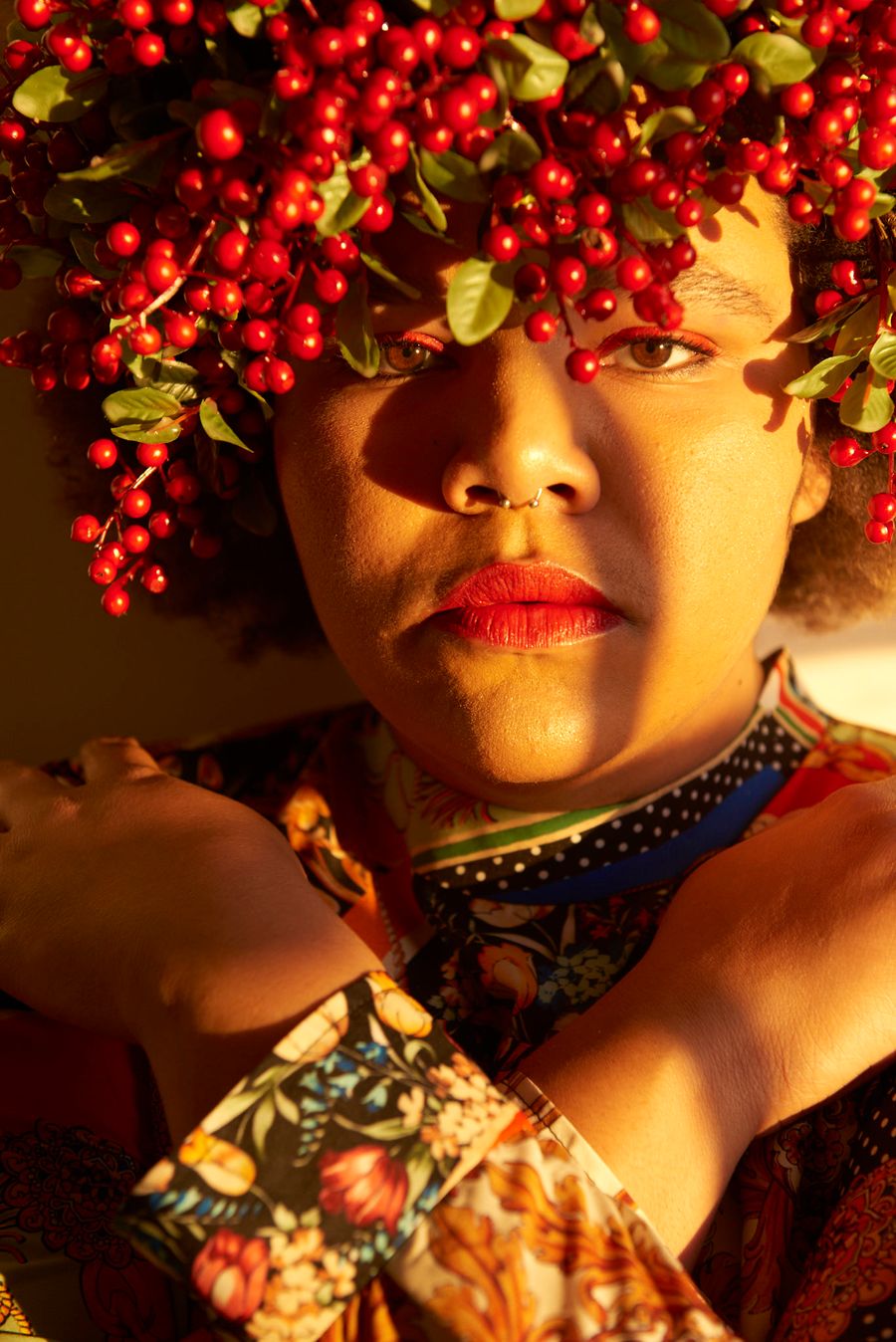
Amyra Leon
Composer of "Broken Bird"
AMYRA is a musician, playwright, author and activist. Her work fuses music and poetry through powerfully transparent performances focusing on social inequalities and communal healing whilst celebrating love, blackness, and womanhood. She has performed throughout the United States and Europe collaborating with the likes of The Apollo, BAM, BBC, Roundhouse, Amnesty International and more. Amyra composed Una Mujer Derramada in collaboration with Sivan Eldar commissioned by and performed with Lisbon's Gulbenkian Orchestra, the Montpellier National Opera, and the Paris Chamber Orchestra. She is the inaugural recipient of the Battersea Arts Centre Phoenix Award which led to the 2019 London premiere of her debut play VASELINE. She is the author of Concrete Kids (Penguin 2020), Freedom We Sing (Flying Eye Books 2020) and Darling (Walker, Candlewick 2022) . Her musical debut, Something Melancholy, led to sharing stages with Common, Robert Glasper, Nikki Giovanni and more. Amyra’s first full length album, WITNESS, is set to release this summer.
Website: https://www.amyraleon.com/
Devon C. Johnson
Composer of "Face to Face Time"
Devon is a music producer based in NYC. He's created music for the K-Swiss Diplo campaign, Timberland, Vera Wang, Rachel Roy, and more. He's also worked with numerous artists producing pop, indie, and rap.
Website: devoncjohnson.com
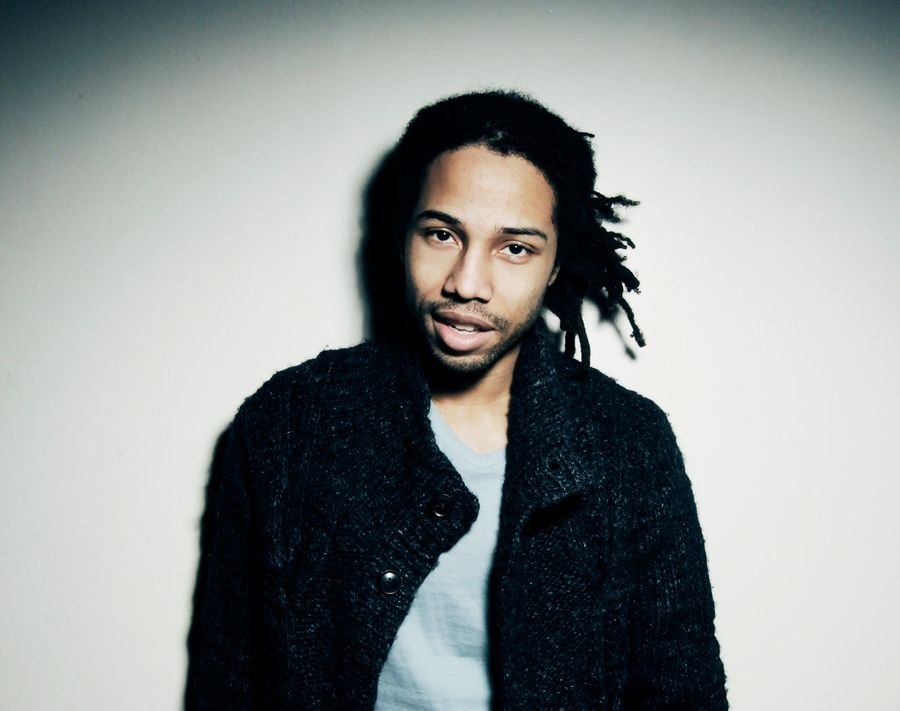

Laura Heinzinger
Composer of "Call Center Blues"
Laura Heinzinger is Alchemy Post Sound’s Foley editor and sound effects editor.
While earning her fine arts degree from Parsons the New School for Design, Laura enrolled in a sound design course on a whim, which sparked her interest in electronic music and sound. Since then, she has scored music, designed and edited sound for films and episodic television.
After working for various post production sound studios such as Harbor Picture Company and Explosion Robinson, Laura transitioned into Foley art and editorial. She joined Alchemy Post Sound’s Foley team in early 2017, and is now a Foley and sound effects editor.
Laura’s work includes television shows like High Maintenance, The Looming Tower, and Berlin Station as well as films like The Blessing, Don’t Worry (He Won’t Get Far on Foot), and Monsters and Men.
Midori Hirano
Composer of "Mizuko"
Midori Hirano is a Japanese musician, composer and producer, born in Kyoto and living in Berlin. She started learning the piano as a child, and this triggered what was to later see her study classical piano at university. Therefore her productions are based on the use of acoustic instruments such as the piano, strings or guitars, but yet experimental and an eclectic mixture of modern digital sounds with subtle electronic processing and field recordings.She has released 9 solo albums so far, and performed at various festivals and events such as Club Transmediale, Rotterdam International Film Festival and Boiler Room Berlin.Besides producing her own works, she composes music for films, video installations and dance performances. The films that have commissioned works by Midori have been screened at Berlin International Film Festival, Oberhausen International Short Film Festival, Krakow Film Festival and among others.
Soundcloud: https://soundcloud.com/midorihirano
Website: http://midorihirano.com/
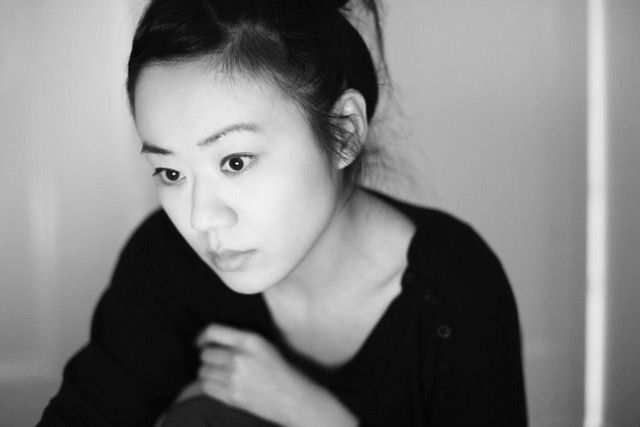
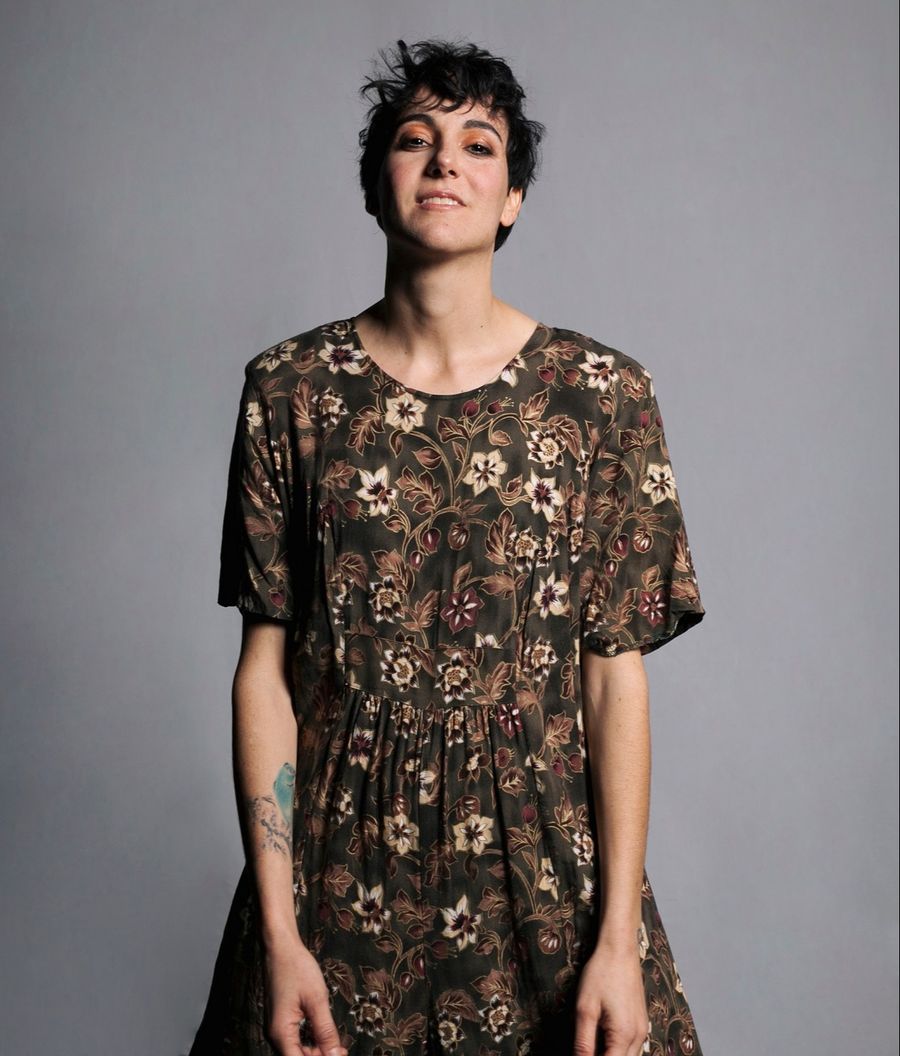
Paloma Peñarrubia
Composer of Gunpowder Heart
Paloma Peñarrubia started her music training at the age of eleven. She received her classical training at SCENICA Málaga and her musical creation education in the private school Artquimia.
Her work as a composer for audiovisual media includes: the composition of the soundtrack of the documentary "La ciudad emergente" by Sergio Martín and Cárlos López, and the feature film "Seis y medio" by Julio Fraga, which premiered at the 18th Malaga Film Festival and gained her a nomination for "Best Original Music" at the Andalusian Film Awards ASECAN 2016. Her composition for the feature film "Bajo la piel de lobo" by Samu Fuentes earned her nominations at the ASECAN 2019 awards and the "Crítica Industria del Cine" awards as well as the Silver Biznaga "Woman on stage" award at the 22nd Malaga Film Festival. Paloma's work has also been seen internationally through fashion films made for brands like OYSHO (Spain), IZZUE (China) and JACK & JONES (Denmark) in collaboration with artistic directors such as Ernesto Artillo, Miren Doiz or Julien Pujol.
She is also part of the Transdisciplina A / V team, where over the past three years they have organized sound, performance and visual experimentation events to promote art and new technologies as cultural and teaching managers.
Website: https://lasfloresnolloranmusic.com/
Sam Trump
Composer of "Hiplet: Because We Can"
Sam "Trump" Harris is a multi-instrumentalist/singer/songwriter from Houston, TX, and has been a student of music from first picking up the trumpet at age 7. Since moving to Chicago in 2009 to obtain his fine arts degree in music, he has become heavily involved in Chicago's live music scene, and is widely known as a band leader, sideman, mentor, & curator. Wherever he is, Sam Trump is known for creating a vibe that is sophisticated & soulful.
A few notable clients are SheaMoisture, Chicago Urban League, Volkswagen Jetta Haus, Sofar Sounds, REI, Chicago Ideas, Navy Pier, BAMSFest.
Sam Trump’s debut album, PURPLE SKIES (2018) documents the early maturation of his solo artistry, covering topics of love & romance, family, inspiration, societal interdependence, & the Black American plight. All songs are produced by long-term collaborator & LA based producer, Calvin Valentine.
The Official Music Videos for two singles from this album have received critical global acclaim for their positive message and imagery. Watch "Brother" & "Count On Me."
Sam Trump is also a long standing member of HipHop, Soul, Jazz band, Sidewalk Chalk, who released their 4th album, “An Orchid Is Born” in 2017, produced by Grammy Award Winner, Robert “Sput” Searight.
Website: http://www.samtrumponline.com/
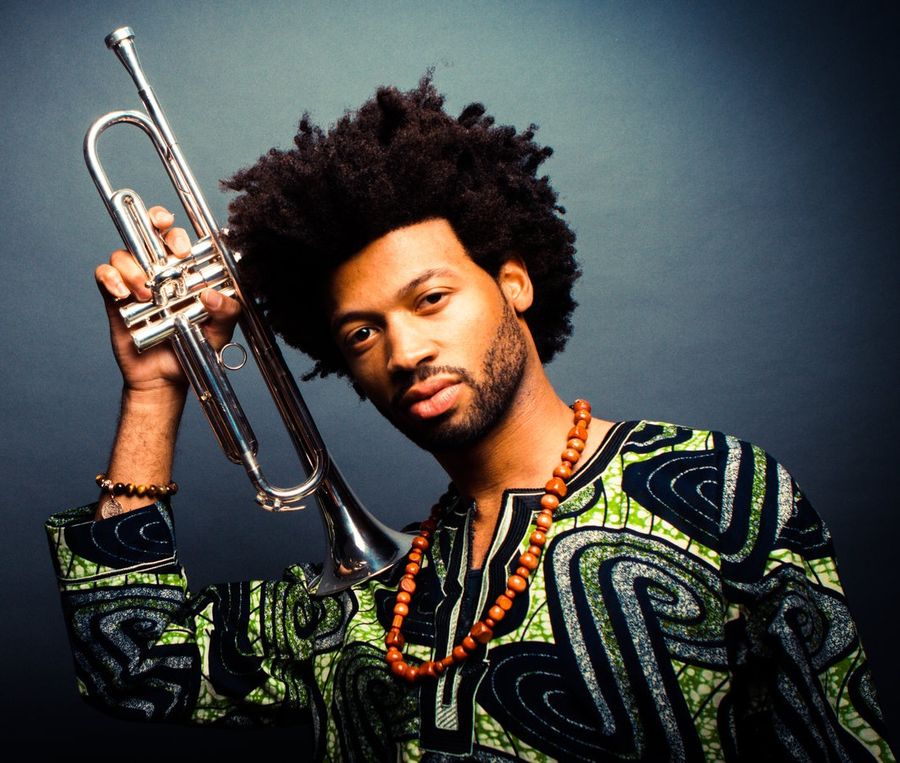
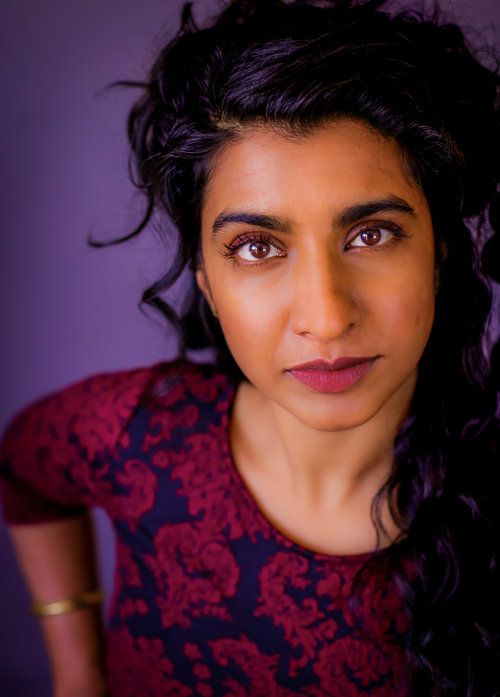
Sonal Aggarwal
Composer of "A Period Piece"
Former international street performer turned emcee turned stand-up comedian, Sonal Aggarwal is now based in Chicago. She is an actor, comedian, writer and producer. She is a regular host of the Moth, and she has performed stand up in Spanish. You can hear about the unexpected series of events that brought her to the world of stand up on her podcast, Rani Rage Radio.
Website: https://www.sonalaggarwal.com/
Tara Trudel
Composer of "Basic"
Tara Trudel is a versatile composer and songwriter based in Los Angeles, California.
Tara has composed the score for award-winning shorts including Basic (SXSW), Uno Por Uno: The Cuban Missile Crisis (Sony’s Voces Nuevas), and Dreamer (Vulture’s Best Comedy Shorts of the Year). Her score for Basic won Best Score at the Los Angeles Film Awards and the Festigious International Film Festival.
Tara previously worked as Musical Director for the legendary Second City Touring Company. A former music teacher, Tara also writes theme songs for children’s books, including Amy Krouse Rosenthal’s NY Times Bestselling UNI THE UNICORN (Random House Kids).
Website: https://www.taratrudel.com/
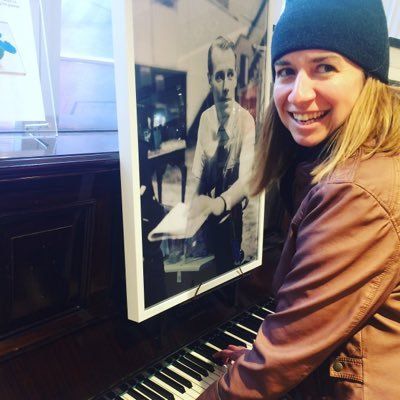
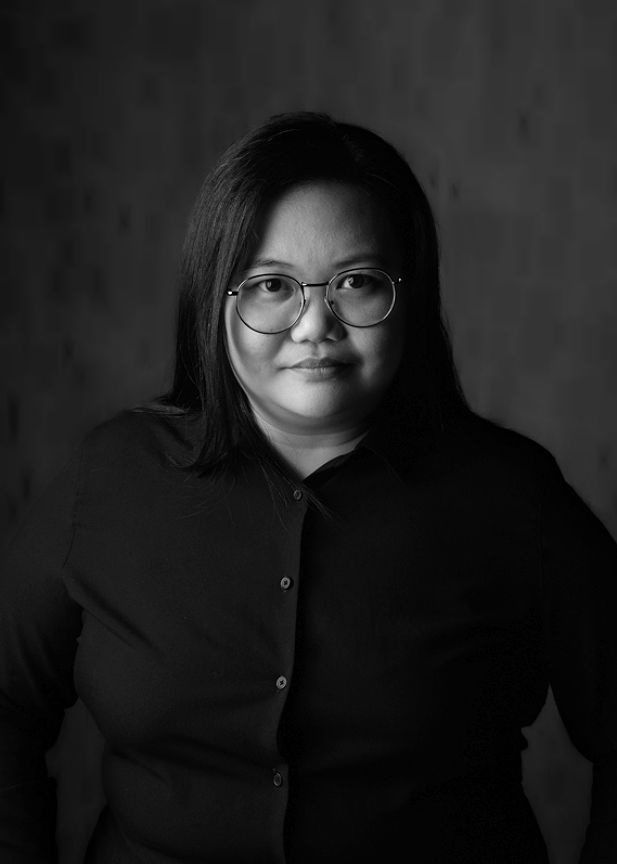
Teresa Barrozo
Composer of "Reminiscences of a Green Revolution"
Teresa Barrozo (b.1982, Philippines) is a sound artist, composer and curious listener with a wide range of work for film, theatre and dance. Her film music works have been screened in major international film festivals including Cannes, Venice, Busan, Locarno, Toronto, and Berlin to name a few. Her sound art works and compositions have been featured in the Sound+Environment 2017 in the United Kingdom, Asian Composers League Festivals in Japan and Thailand, and Asia-Pacific Weeks in Germany. She was one of the fellows of the Asian Cultural Council in 2014. She was also granted an internship by the Biosphere Soundscapes in 2016 and was invited to create the theme for the World Listening Day 2018 celebration.
Influenced by new practices in contemporary art, tradition in aural orchestration, and storytelling in cinema and theatre, Barrozo’s current sound work expands to various disciplines, often exploring and exposing new perspectives in listening culture.
Website: http://www.teresabarrozo.com/
Rebecca Grierson: Hi, everyone. Thank you so much for joining us today for a very special discussion, which is highlighting underrepresented composers whose work has been featured by Prime Video's South by Southwest 2020 Film Collection. So the collection is going to be available online until the sixth of May. And if you're not familiar, Free The Work is a nonprofit initiative dedicated to identifying systemic inequalities in film, television, advertising, and media, as well as finding solutions and more opportunities for work for under-represented creators.
I'm Rebecca Grierson. I'm in New York. I'm your moderator today, so I'm a Free The Work advocate and music supervisor, and also the managing director of SixtyFour music. And today I'm joined by some amazingly talented composers from all around the world. Firstly, we have Paloma Peñarrubia, we have a Amyra Leon, Sonal Aggarwal, Devin C. Johnson, Teresa Barrozo, Sam Trump, Tara Trudel, Laura Heinzinger, Midori Hirano, and Ariel Marx.
So yeah. Hello, welcome everyone. And yeah, we're going to start by just getting you all to briefly introduce yourselves. So when I call out your name, just say a little bit about the film that you've composed and where you are and… Yeah, just a quick intro to everyone.
Amyra Leon: My name is Amyra. So I'm Amyra Leon. I'm in New York City right now. And I composed an original song for Broken Bird by Rachel Gordon.
Sonal Aggarwal: My name is Sonal Aggarwal, and I'm here in Chicago. And I create very simple compositions. And I created the outro, the end credit music, for a film called A Period Piece, that is also available to see on Amazon Prime.
Paloma Peñarrubia: Hi, my name is Paloma Peñarrubia. I am from Spain. I compose part of the original soundtrack from Gunpowder Heart. And I tried to make them music, by basic distorted electric guitars, some kind of style close to the [inaudible 00:02:50] to represented the darkness of the streets [inaudible 00:00:02:59]. And I hope you like it.
Rebecca Grierson: Thank you.
Devon C. Johnson: Devon C. Johnson. I'm based in New York. I'm more of a music producer who likes to put music to films and things, so lucky to have this. And I did the music for Face to Face Time and had a lot of fun with it.
Teresa Barrozo: Hi, I'm Teresa Barrozo, and I'm from the Philippines. I composed the end music for Dean Colin Marcial's film, Reminiscences of the Green Revolution.
Sam Trump: Hey everyone, I'm Sam Trump. I'm a trumpet player. That's my artist name. I'm originally from Houston. I've been in Chicago for about 10 years, and I've done some film composition. Particularly for this meeting, I did an opening composition on trumpet for the film Hiplet: Because We Can, directed by Addison Wright here in Chicago. Happy to be with you all.
Tara Trudel: I'm Tara Trudel. I composed the score for Basic, which we call a very, very short film.
Laura Heinzinger: Hi, I'm Laura. I composed the score for Call Center Blues. I'm also in New York right now, but I'm primarily a sound editor for film.
Midori Hirano: My name's Midori. I come from Japan, but now based in Berlin and Germany for over 10 years. And I composed music for the short documentary film called Mizuko. Happy to be here.
Ariel Marx: I'm in Los Angeles now. I lived in New York for many years. And I compose the music for a short film called Blocks and a feature called Shiva Baby.
Rebecca Grierson: Well yeah, nice to meet you all. We're going to go back around and go into a bit more detail about your work. First, we're going to actually have a quick reel and show some of the highlights of your films and some of your score work.
[Plays a reel with video clips from the films]
Speaker 1: (singing) I think I found my happy place.
Speaker 2: I was the first child born in an ambulance here in Tijuana, Mexico.
Speaker 3: Basic, basic, basic, basic, basic. You basic little trashcan.
[End reel]
Rebecca Grierson: Starting off with our questions, I really wanted to talk to Teresa first. I really want to ask you about the 89 films that you've scored, which came up on your IMDb, which is very impressive, and multiple awards. So yeah, we'd love to know how you started scoring films in the first place.
Teresa Barrozo: Okay. I actually studied composition in college, although in college, we weren't taught to compose for films. We were taught to compose contemporary classical music. But I've always been fascinated with storytelling, of course, through sound and music. Again, I felt that I didn't really learn much of the film scoring process in my music school. Instead, I learned it by hanging out with student filmmakers, which was actually housed in front of our college. So I often took classes in film and started collaborating with film majors when I was a student. And I started out with short films, with film exercises, without really knowing what I can do. All I knew was, "Okay, I can compose." I wasn't familiar with the film language yet. But luckily, my collaborators guided me. So yeah, I guess that's it.
Rebecca Grierson: Oh wow, that's amazing. Is that how you built up so many contacts to work on all the other films? Because you've just done so much work.
Teresa Barrozo: I believe so, because I never had contacts who were… Most of my contacts were students. And as years passed by and I grew as a composer, I grew with them. When they graduated from college, they started making… Some were in advertising, some started their first full length. And then they tapped me to make music for their films. So it was growing side by side, I guess. And then later on, I started to meet more senior directors. And that's it.
Rebecca Grierson: Yeah. Well no, that's definitely… Yeah, I mean, I haven't had a chance to watch all of them. But yeah, looks like such a big range at work. It's incredible. And what would you say, in all of those films, what's been some of your career highlights so far?
Teresa Barrozo: Oh, that's a hard question. I guess one of the highlights was, I guess, working with, for example, Brillante Mendoza, whose films were featured in Cannes. I think in 2009, he won Best Director in Cannes for his film Kinatay. That's one. And also with the same director, recently he… For the film Ma' Rosa, it competed in Cannes, and it won Best Actress. Most of my collaborations, I guess I got lucky that the works were going around internationally. Yeah.
Rebecca Grierson: Yeah. That's great for recognition. Did you get to go to Cannes Film Festival? Did you travel there?
Teresa Barrozo: No, no, although my only experience is just seeing pictures. Pictures and hearing stories about, of course, cast parties when we celebrate the win of the film. Yeah.
Rebecca Grierson: Well, not yet. Still time. And help with the concept of the short film that you've worked on, which is screening on Prime Video. Can you just tell us a quick bit about that, how you came up with the concept for the score? It's a really beautiful piece of music, and it feels like there's different motifs for the characters. And interested to know your process for that.
Teresa Barrozo: Okay. The process here is very unique for me. First of all, my collaborator was Dean, the director. I never met him personally. We corresponded online. So his film actually was already almost done when I entered. In fact, since I mentioned a while ago that I provided the last piece for his work, that eventually goes to the closing credits…. It was easy and not so easy for me, because he had this very beautiful Filipino song as a temporary track in the ending, which unfortunately he can't use because it's a temporary cut. So I had to recreate, and it was working. It was working so well. I even didn't want to change it. So the challenge was to recreate the feeling that that song provided, but it's hard because it's a very popular song and it already had its own character. It was already commenting on the whole thing, the whole ending. So it's hard to recreate something that has so much history already.
For that ending, I had to create a song. I had the lyricist with me, and we had to really collaborate. And the lyricist and I, and of course Dean, had to agree on what the music should be saying in terms of texts, and also in terms of sound. And we did this. It was a choral piece sung by one person, one tenor. One tenor, but he recreated the harmony for the song. Yeah, it was a short piece.
Rebecca Grierson: It works. Yeah, really, really, honestly. Good job. I hope that you [inaudible 00:14:13] or something someday, because it's a really nice… Music. So congrats. And yeah, just one more quick question. Can you tell us all what you love the most about scoring and being a composer?
Teresa Barrozo: Oh, wow. This is hard. Okay. I've always believed in sound… Sorry. I keep on saying "sound" because I'm fascinated with sound and music and how, as a composer, I can actually lead the audience to feel something. In fact, I feel that… Okay, as a job, I'm a composer for film. But I feel that I've… How do we say this? Sorry, I'm losing my…
Teresa Barrozo: Okay. As a job, I'm doing music for film. But I feel that I'm interested with how music and sound is used outside film, how the use of music and sound can change ideas or change people's perspective. And that's what's actually my job when I score. I can make people believe in something that's… I can make people believe in something that's bad and make it work, which is not good. But again, that's this power of also changing people. So yes, this is a job for me. I have a responsibility to the audience, but at the same time, music has a power of changing perspectives, even outside the arts. I am fascinated with that.
Rebecca Grierson: Yeah, it's definitely a dream job, isn't it? Yeah, thank you. Really, really great to hear from you. And I can't wait to see what you do next. So yeah, keep us up to date with your work. I'll move on to Tara next.
Tara Trudel: Hi.
Rebecca Grierson: Hi again. Yes, I really loved your short, short film.
Tara Trudel: Thank you.
Rebecca Grierson: [inaudible 00:16:55] the whole creative process for that and how you came up with the concept for the score.
Tara Trudel: Sure. So Basic was directed and written and performed by Chelsea Devontez, who is someone I've worked with closely for many years. This is probably about the sixth or seventh thing that we've worked on together, even though some of them have never been released or seen the light of day. So she and I have a very easy way of communicating with each other. She's a director with really clear vision, and she comes in kind of with a clear idea. And I think at this point, I know how to translate that vision into sound. So it's always a pleasure to work with a director who really knows what they want for me, and Chelsea is that person.
Rebecca Grierson: That's great. So after you read the script for it… Because it's such a clever concept. I don't know if you can explain that really quickly to everyone. But how did you, after reading that script, go, "All right, you're going to come up this direction with music"?
Tara Trudel: Yeah. So, I mean, the script was very clear. So Basic is a very short film, but it's twisty. It starts out in one world and then there's a twist, and the mood and the atmosphere totally change. So it was very clear to me that we needed a real shift in the sound as well. So the beginning is sort of aspirational, and then it becomes more dark. Chelsea didn't want it to be exactly horror, but kind of live in that world.
Rebecca Grierson: Cool. No, it's great. You did such a good job of not making it distracting, because it's-
Tara Trudel: Thank you.
Rebecca Grierson: And in your past, really, you were a music teach formally. Is that something that you still do? And how did you actually get into composing?
Tara Trudel: Yeah. So I started my career… Actually from Chicago. Hi, Chicago friends. I started as a teacher, but then I moved to live theater. There's so much theater in Chicago, and I became really involved with the comedy theme. And I was hired as a music director for The Second City, and I toured with them for several years. And so that job involves live scoring, creating all the sound for a show, directing actors, helping them with their vocal technique, arranging songs. There's a lot that goes into it.
So from the process of going through that job, I met a lot of collaborators. And as they shifted from live theater to digital, I also shifted from live theater to digital. And so I've been working with a lot of the actors and writers that I met in Chicago through Second City.
Rebecca Grierson: Great. Great. And yeah, do you prefer writing for film?
Tara Trudel: I do. Yeah, I will always love live theater, but there's just something about having a tangible product that you can return to again and again that I really love. Yeah. So the transition to film has been really exciting and fun.
Rebecca Grierson: Great, great. And yeah, just parting words. Do you have any advice for other composers wanting to getting into film scoring?
Tara Trudel: Yeah. I would say find your people. That, for me, has been the key to it. Find the people who you really want to work with. And sometimes you can look ahead at someone who has a really great career and think, "Oh, I would love to work with them." But if you do that, you might be missing the people who are around you, who are at the level that you are. It's been such a pleasure for me to grow with people in our careers at the same time. So if you can get involved with up-and-coming filmmakers… Comedy, to me, my heart is in comedies, so getting other people who like to write comedy and do things in comedy, finding that community, was really key for me.
Rebecca Grierson: Great, thank you. That's really helpful to know. Yeah. [inaudible 00:21:11] Great. We'll come back and chat to you more later. We're going to speak with Midori next. Hi, Midori.
Midori Hirano: Hi.
Rebecca Grierson: Yes, I really loved your short film.
Midori Hirano: Thank you very much.
Rebecca Grierson: How did you end up collaborating with…
Midori Hirano: Kira and one of the directors, she got in contact with me to ask if I can compose some music for her film. I didn't know her at all at the time, but she knew my music already because I produced my previous album some years ago, and she said she found it great. And she gave me some images of the film she was going to make.
And I found it very beautiful. And so I said yes. Yep. And she sent me some short clips of the film of the film and also the texts about the concept and how it would be the mirror to the film. So I found it a very beautiful film, so we're happy to compose.
Rebecca Grierson: Great. And would you say did, were you like an artist before you became a composer or was it way around?
Midori Hirano: I had a background of classical piano education, so the piano is still my main instrument both for composing and playing lives. And after finishing my study I got hired by the music studio in Tokyo where I learned a lot of skills of making music, soft verse, hard verse. Because at the time, I had no idea about how, how it works. So I got to learn how how it works and then got involved in a lot of advertisement to music at first. So after a year of working I, I kind of get tired of making them always, but doesn't music. So years of working for the advertisements and I wanted to be an artist and try to make my own music and at some point I a label to reach my music. So yeah. Yeah. So it's already taken a long time.
I took 10 years and I'm still trying to develop my skills and then you spread it. But radio city music is, it's only a key for me to get involved in the film music. So yeah, I find great, great filmmaker found my music at some point somehow and then they got in contact at the end.
Rebecca Grierson: Yeah, use it before the film. Like really big fan of your music is such a beautiful that everyone listened to her album because it was great. So yeah, I think it's interesting that that's like perhaps like a tool to like attract more directors and filmmakers. If you are an artist, you have an album out and that can be a helpful thing to try and raise your profile and let more people find your music. So music, it was a really good collaboration between you and yeah, congratulations as well because it's won the special jury award.
Midori Hirano: Yes, I'm very happy about it.
Rebecca Grierson: Really great. So. And yeah, just like one more thing to ask you like yeah. What's next for you? If you've got kind of plans for your career next. Are you planning to do more films? hmm,
Midori Hirano: As they have done so many experiments experiencing of scoring music. But I always, I always want to, to get more chances. It's just going to be what's come up at the moment. I, I'm working on the down pieces for the theater and the date this year. So at the moment I don't have any plans for starting scoring music but, but I'll be happy to do it over.
Rebecca Grierson: Well, the dance stuff sounds really interesting as well, so yeah, keep us posted on that. Before we move on, and I want to ask kind of everyone, like a bit of a general question so anyone can feel free to sort of chime in. But I'm just Germany like interested in people whose craft and how everyone else kind of learned how to compose music for screen.
Devon C. Johnson: I would jump in, but I don't, like I've said before, I don't consider myself a composer. I've never had any technical training, so I'd be curious to know as well. But I just make music songs for. Then put them to films, you know, and hope the director likes it and the people too. So I'm not like, yeah, I wish I knew more about actual composing for film
Ariel Marx: Just to speak to that. Devon also, you know, it's like, what's really exciting about this time is yes, there are master's programs in ways that people, you know, go to higher education to do this, learn this craft. But so many people are coming into it from so many different angles. And I think that's why the field is so amazingly interesting and inspiring and ever changing. So, I mean personally I got, I went to school for it, but I'm also, you know, people who come up through bands or people just, you know, directors find your sound and it doesn't matter whether you, what path you got to get there and you learn how to do it on your way and it's helpful to have the tools and it's always, you know, advantageous to be as, as educated as you can about what you love. But I personally, I love how many people are getting into it from all different angles and it's really pushing everyone to, to to really explore different different ways.
Devon C. Johnson: Yeah. Cool.
Tara Trudel: Yeah, I'm a trial and error composer. I'm not trained in film scoring so I just learned on the job like a lot of other people.
Rebecca Grierson: That's cool. I feel that that's really encouraging to aspiring composers that you don't have to have gone to music school necessarily and done that kind of path of being classically trained or you know, it's very like open to different backgrounds and that it's not something that's like, you have to have this experience in order to become a screen composer. So it's good to hear everyone has a completely different journey to get here. So that's great. Okay.
Amyra Leon: Really quick. I don't think there's a really a separation at all. We're all manipulating sound, you know, and I think that as a composer there's no, a composer is not, is an artist. So there was a separation earlier between an artist and a composer and they're the same thing, you know? And we're all dealing with sounds. And how do we intuitively invite people to feel something or access a level of emotion in visual nature? You know what I mean? It's a human thing. So I don't think there is a barrier to break or an education to receive other than to understand sound. You know what I mean? And there are people who are called to bring that understanding forward and to invite others to experience it. And there are people who are meant to receive, you know, so not everybody is a, a composer I suppose, but I think that everybody who works with sound is an artist and everybody who an artist in sound is a composer.
So I don't know, that's just my thought about it and I was like, you know, I don't think there's a real difference. I think that all of us here are talking about, yeah, I don't know. We'll find out what else we're talking about, but I just wanted to say that before we move forward.
Rebecca Grierson: Right. Thank you. Pretty great point. I think, yeah, you've got to, there's no luck, hard fast rules. I think we can make up the rules as we go with this. And it's all about creativity, which is at the heart of it. So it doesn't really matter how you've come to it and which came first. I think you're right. It's kind of, it's welcoming to every kind of different pathway. So, yeah. Good point. Thank you. I really want to chat with Sam next and find out a little bit more about Hiplet. The film that you worked on recently. It's such a cool kind of obsessed with that film is amazing. I didn't even know that form of dance was a thing until I watched it. So yeah. Really cool. So how did you come to work with Addison Wright?
Sam Trump: Yeah, so I'm here on behalf of Addison, right? He's an amazing friend of mine and also an amazing creator. He and I, so I'm an artist. Well, I started playing, it's not there when I was like in third grade and just stuck with it. I, and I've been an artist for about 15 years and most recently I have been doing some, some film compositions. And the first time I got in contact with Addison I actually hired him to direct a music video of mine. And so we had an amazing shoot and we just, you know, said that we would just stay in contact and you know, work together here and there. And he reached out and he, he, he mentioned this idea for the hip rate organization and yeah, it's an, it's a, it's pretty much the balance between hip hop and ballet, you know, so that's why it's called Hiplet and I something new, you know, something that they created out here in Chicago.
And so yeah, that's how I got in touch with Addison and this, this whole idea of his and he brought when he, when he mentioned the hip hop Hiplet film, and he helped me to the group, I was able to come to a shoot where they were you know filming some segments and I was just blown away by the, the way they dance, you know, it was pretty unique and how they, how they blended the two genres and beyond. Hmm. And yeah, that's how I, that's how I know Addison and how this came about.
Rebecca Grierson: I forget there's a really beautiful solo that you play at the star of the film, which [crosstalk 00:34:15] you featured in. And how did that idea come about? Was that your idea? Or
Sam Trump: That was Addison's idea. And the thing about Addison, he's super innovative and he's very much visionary, you know, so he's in the right field. Anytime we've kind of collaborated to come up with ideas for film, me as a, as a musician and artists, you know, I, I usually come in with, Oh I think it's going to work this way, you know, but just seeing a film worker, a filmmaker at work is really a beautiful and amazing to witness because the perspective is just different, you know? And so he was like, man, I need some type of intro, I need an intro that's kind of real, kind of like airy kind of, you know, you're trying to figure out what's happening, you know? And so he's like showing the Chicago streets he's was just a lot of, a lot of scenery. And then you hear this trumpet playing with this reverb and it's delayed.
They, [inaudible 00:33:36] know pulls a little bit, you know, at the emotion. And then I'm the first person you see on, on the screen and it's me and my trumpet and I'm on the street. It catches me right at the bell. Right. And then it pans over and this shows one of the ballerinas walking and then she turns and goes into this the building and then the director comes and he just, he gives his intro there, what is delayed, you know, what is this? And so that was his whole idea and I was like, Whoa, this is cool. I'm honored to be the first person on the screen. [crosstalk 00:34:15] Performing live is pretty much my main thing. I'm a full time artist so I haven't been doing much lately obviously. But for the last six years I've been full time writing and so performing is my thing and so it was also an honor to be able to perform working in, in addition to composing,
Rebecca Grierson: I noticed that you've worked in advertising as well for doing some scoring work for advertising in the past. Is that something that you enjoy doing? Do you prefer doing films or ads? Do you have a preferred medium to work with?
Sam Trump: Yeah, so I've, I haven't done much but I, I've done quite a bit of different things as it relates to composing. I have done a couple of advertisements I've composed for film here. I've composed for a theater as well. I have production company that are not co-founder with a friend of mine and pretty much we put together this one, well we've done two shows now. Our last one was at the MCA last year and we did this show where I compose a famous to soundtrack for a 50 minute show where there's dance and poetry and so there's like arcs, you know, throughout the whole show. And that's cool. I think I liked that the most because it was definitely a learning experience, but I'm just, I haven't done much work, but I've definitely just kind of tried to find opportunities to, you know, to get my feet wet and try new things because that's, that's what I'm all about. So it's a big challenge. Even if I don't know how to do it, I, I'm, I'm going to learn how to do it and try my best
Rebecca Grierson: Oh well yeah, that, that film's a great start. I think everyone needs to watch it. It's really cool. Yeah. Really nice speaking with you and come back to you a bit later if we've still got, I forgot Amyra here. Did I say it correct?
Amyra Leon: Hello.
Rebecca Grierson: Hello? How's it going? [crosstalk 00:36:24] so tell us about your background as a composer, artist, I don't know. [crosstalk 00:00:36:31].
Amyra Leon: I am, I do a lot of things. I'm a musician and a writer. Well I write books and plays and music. I write new songs for myself and for others. Whenever I like I try to describe things and I'm like, I go on forever cause it's so much. But I really just work with language, you know? And how do I invite communities to heal? And then I decide how to which medium is most likely to be impactful depending on what I'm being commissioned to do, what it is that I want to do with the next six months of my life, what I want to do with the next few hours, you know? So, yeah. So I just work in many different fields and my work focuses all on socio economic disparities and communal healing and celebration and black womanhood. Yeah.
Rebecca Grierson: Yeah. Oh, you've got a lot going on. I love it.
Amyra Leon: Yep.
Rebecca Grierson: So in terms of like Broken Bird, which is going to be streaming on prime video, like what does it mean to have that film showing? Cause you did an amazing… [crosstalk 00:37:58]
Amyra Leon: It's really exciting. Yeah, Rachel's incredible actually. So I've also performed live on I've been performing live for like five years or something and I've only been singing and doing music for about five years. I've been doing poetry my whole life and then you know, my church one day was like girl you're gonna come up here or not and I was like what you talking about? And then suddenly I was a singer so I was like, Oh if I can make the people feel in church, I know I can make them feel worldwide, you know? Rachel, actually Rachel Gordon is an incredible woman who hit me up and actually asked me to sing at her wedding. She said that one of, one of my songs for my first like released project was her and her partner's, just like foundational track to their relationship. And she asked me to sing it at their wedding and then I did that, which was absolutely beautiful.
I was, I've never sang like my music on a wedding before. And then a few weeks or a few months later, she hit me up and she's like, I'm a filmmaker as well and I kind of need you to write a, an original song for this film. And broken bird looks at, you know, a young biracial girl who is being, who is, who is black and being raised by her white mother. And, and she's at this moment where she's preparing for a bar mitzvah, right? And it's like, Oh my God. Like it's such a beautiful moment in a real experience. I'm absolutely, I'm going to come in here and see how we can best elevate the beauty of this moment, the tension of this person's experience and celebrate it. So it was really great, to like celebrate her real life, like, you know, this new era of her life with her and her family, and then write a film, write a song that kind of encapsulates this moment that she also really lived, you know? So yeah.
Rebecca Grierson: Yeah. It's a really cool song. I love it. Like did you, so did you actually write the song before they shot it? So they had that onset and did, is it something that you wrote after?
Amyra Leon: No, she sent me the script and then again similarly to Midori sent me the script and who she wanted to cast. So it was like from the inception, like I was looking at words, the lead character's name is Birdie and like, you know, I was like, okay, let's talk about flight elevation. You know, I'm just over the whole process. We were in communication but I didn't write it until the film was done cause I just wanted, I didn't want, I wanted to be able to have her vision fully live before I impacted it. And so it just was really crazy to be a part of that.
Rebecca Grierson: Nice. And how about how long did it take you to create that song? In total?
Amyra Leon: Honestly, I am like rooted and improvisation. If I focus on something for a few hours in my mind, by the time I make the music, it takes approximately as long as the song is for the vocals to come out. And so most of my music is like kind of known because the minute it is recorded as the first time, the lyrics, the melody and everything has ever happened. And so I kind of write in the moment. And those are moments that are then captured because I record everything I do. I can't actually just sing without recording cause I'm like, I'll never know what it is again. So I it took, it took maybe like, you know, a few hours to just come up with the foundational, you know, the words I had the words immediately they were recorded and then I just built a soundscape around it.
So it was very quick. I could make things very quickly. I believe that we should just release them and move forward. I'm not going to do, I will always get better, you know? And so I'm interested in what I'm doing right now because I know what I'm doing tomorrow is going to be, it's a different kind of excellent.
Rebecca Grierson: I think that's why it sounded so authentic as well. So it's like sometimes you can over tweak things and overdo it. So, [crosstalk 00:42:18] . Do you know that? So, yeah. Thank you. And we'll chat to you again a bit later. I've got to move frequently. We're running out of time. So Ariel, I really want to chat to you about blocks because wow, it's such a cool concept about a woman swallowing Lego and throwing it up. So really interested and the score is quite synthy and almost like glitchy, but melodic and. I just really interested in how you came up with that concept for the sound.
Ariel Marx: Yeah. So Bridget Maloney, the director, she's a mom. And just for everyone here, the, the, the summary of the film, it's a mom who's, you know, a bit overwhelmed and suffocated by raising these two kids. You know, the only time alone she gets is in the bathroom. And so she's, she starts developing a kind of psychosomatic experience where she starts throwing up toy blocks and they start, they start getting bigger and it's kind of this kind of private, private experience, the anxiety experience and it's beautifully done. Very comedic, but it's also has dramatic undertones to it. The score, she, you know, we had talked initially about the palette and we both knew that we wanted it to be synthy and playful and the opening credits are kind of setting up the tone of the world. They have a lot of it's, it's meant to kind of encapsulate the chaos of what it is to kind of be in a household in disarray of having like no real independent space. Yes. Or like even, and your body is. … Or even your body is not your own, and just the chaos of that. There's a lot of kids' toy sounds incorporated into the score, and it has elements of a lovely upbeat synth texture, that you'd love to listen to, but there are disturbing sounds of toys coming in, here and there, and darkness. It's a chaotic environment, she doesn't quite have her hands on.
Rebecca Grierson: It's super fun. I love what you did.
Ariel Marx: Yeah, it was very fun.
Rebecca Grierson: You've worked in quite a lot of films, also. Before that came [inaudible 00:44:43], and also you've recently worked on the Ted Bundy, for Amazon, as well. That's more of a totally different sound, a more classical score, and it feels like you've very versatile as a composer and multi-instrumentalist, as well. I just wonder how you've managed to master so many different types of scoring techniques.
Ariel Marx: I think what's kind of the best part of being in this industry is you are being pushed constantly by other people, and collaborators. You are making music for yourself, but it is in service of a story. You do get inspired and pushed in these different directions, that you wouldn't necessarily do that in. Bridget's film was so nice because I did get to explore and use all the synth pallets that I have. Then for the Ted Bundy documentary, it was really lovely to get back into classical roots. That series was very much a reframing of the story of Ted Bundy. So often it has been told been focused on him, and the gruesomeness of his crimes, and psychoanalyzing him, and this version was really about the women in this story, and the victims left behind. The score had a lot of empathy, and sorrow, and poignancy, and it wasn't about scaring you, it was just about emphasizing the weight of history. Again, that's my favorite part of this job, is you get to do so much, pushed in so many different ways, and you're really constantly learning yourself. I love what you said about tomorrow is going to be another kind of excellence, and with film it's great too because you can't labor on it for too long. You have a certain amount of time you can work on it. You really have to give your work away. It just keeps you hot on your feet a lot, and I love that.
Rebecca Grierson: That's great to hear. Also, though, how did you get your first gig composing, how did you break into it?
Ariel Marx: My story is a lot like Tara, is that I met people when I went to school. I went to school in New York, at NYU, and they have a great film school there, too, and then Columbia Film School is also in the city. I really sought out as many people as I could, and made as many connections as I could. Everyone I know says this, but you can trace back all of your work to a single connection, or a single first project, and so it was just about finding as many collaborators as I could. A student film I had done many years ago then turned into the Tale, then turned into all these other things. It takes time, but it kind of snowballs and builds up. It's just about getting your work out there, in any way you can, and creating your own album. I'm about to release one this summer, and I think that's a great thing, [Midori 00:48:07], that you had as an asset to just something that you did without any kind of visual inspiration, no film that it's tied to, but it's just your voice. I think that's something people who are always working on films should really push themselves to do to really get their own voice out there, as well, which inevitably leads to more work, too.
Rebecca Grierson: Yeah, that's a really good point. I don't know where you find time to do it. You work with an agent, who represents you. I want to talk about that a bit, because was it hard to find an agent, did they find you? Do you think people need an agent in order to be successful in the feature film world?
Ariel Marx: Sure. So many people have different stories and relationships about how this works, and it is an industry of connections, and then of course having an agent helps you foster those connections, and seek out those connections. I was able to get interest from agencies after I had a feature at Sundance. Again, still first being … You know, I'm still quite in my first several years in my career, a lot of it comes agents are wonderful because they get projects that you may not find out about. A lot of your personal connections projects come to you through connections that you've fostered, but it's hard to get your finger on projects that are just out and looking for composers. That's where agents are really wonderful, to come in and kind of tell you about the projects, pitch you on them, and sometimes they manifest, and sometimes they don't.
I have a great agent, Rich [Jackabellis 00:49:56], at Fortress, and he's been really just a mentor, supportive, cheerleader at times, and then also just a tremendous sense of resources. I know people who are flourishing just fine without them. It's just a matter of getting access to … It's like diversifying your portfolio. You have your personal connections, you know where films come from in your community, and agents are really great at getting you other projects that you would know about. Then also keeping you very much just about the art, and not about contract negotiation, not about that can kind of be a separate limb, that it doesn't really influence your relationship, which is a nice separation to have.
Rebecca Grierson: Thank you. It's really good to hear from you. Moving on real quick, because we are really running out of time. I could chat to you all day, because everyone has got such interesting career paths. It's very inspiring. I would love to talk quickly about what's going on right now, in terms of social distancing, and wondering how that's effecting your workflow at the moment, and how you guys are adapting to working remotely. Has anyone got any good insights to how they're finding work, and keeping their work going at the moment?
Sonal Aggarwal: I'll say something, since everyone is so excited to talk about how they're not working. As somebody said to me, and I've been saying this to myself, the best thing that any of us can do right now is get good at the stuff that makes us feel good, and that's already a lot of stuff to practice. That's been kind of like a very long mantra, that I've tried to … Because this is a time, and this is a period, and I can see from everyone we're all in a position of privilege, that we're not out in a slum or something, facing that reality, and that this too shall pass, this will pass. I feel like there's part of us that's almost like there are moments when I'm like this is going to be over, this is going to end, and we have to invite creation, and that's why everybody is talking about how their in teams, and how they need other people to hold them accountable. We've all pivoted into Zoom world. I don't know how many Zooms everyone is in, but I'm very grateful for all of this right now. We were all supposed to be actually physically meeting each other at South by Southwest, in theory, and we're all adapting in different ways.
I'm applying for a lot of grants. I've gotten several, which has required me to recognize the full breadth of my career, and what I have made possible, and what I have done. I was supposed to be going on tour for my album, and I was on stage when the French president announced that live performances were banned in Paris, in the biggest moment of my career, opera house with an orchestra behind me, standing there, performing to an empty theater. I was like this is the biggest moment in my career, and I was meant to experience it alone, and what does it mean when an artist has the moment as it's happening.
I've done so much, and [inaudible 00:53:41], and a lot of people … My friends, we go on tour so much, we're like oh, fuck tour, or I have so many films to do and so many things to do that I don't have the time to actually enjoy what I'm doing, or to really experience it as it's happening. It's all in retrospect, all a new beautiful thing to my resume, and an addition to my funds. I think that this moment a lot of artists is people reflect on the way they actually are, how their work has been able to impact people around them, what they're being called to do, what they're being called to focus on and practice, but also the industry around us that has not been operational with the [inaudible 00:54:23] to take responsibility for the people who give the people art and healing. I'm just been shocked by the generosity, honestly. If you guys haven't applied for grants, I don't know if you need them, if you know anybody who does need them, they are making it easy for them to support you.
I think it's important that the industry remembers this moment, that we could have been protected, we could have been respected. I hope that people are taking the time to really celebrate, and to sink in, and to enjoy their work again, and to find out the things that weren't serving them, and hopefully never return to those.
Rebecca Grierson: It's a good outlook. I like it. There's definitely some things I'm not going back to. Good chance to reset, I feel like, a lot of creators. In terms of what we have next, I wanted to speak to Laura, about her film, called Center Blues.
Laura Heinzinger: Hi. Good. How are you?
Rebecca Grierson: Yeah, good, thank you. Just really want to talk to you about your background, and how you came to composing. You originally were a Foley sound editor.
Laura Heinzinger: Yep.
Rebecca Grierson: [crosstalk 00:55:40] curious to know how you've made the transition to become a composer.
Laura Heinzinger: I've always been a musician. I started playing piano, at the age of six, and it's always been a passion of mine, and I've done it forever, but I always knew I wanted to be a creative person, and I ended up going to art school, and studying visual art, but it was kind of an interdisciplinary education, where I got to explore a lot of there are a lot of new classes that were like sound art classes, where I got to explore music and sound, and then I took a sound design class, just on a whim, because I thought it sounded cool, which ended up being more of an electronic music class, but it introduced me to the various [Daws 00:56:37] that are out there, I learned Pro Tools, Logic, [Ableton 00:56:41] Live, and so I just fell in love with it from there, pretty much.
After college, I just was trying to figure out a way to apply these skills in this interest professionally, and I happened to get an internship at a Foley studio, which for anyone who doesn't know what Foley is, it's basically custom sound effects for film, where a Foley artist will be performing sound effects live to picture. If on set there's dialogue happening, and someone slams down a glass, but it was either gated out, or they edited it out, we recreate that sound, and try to perform the emotion behind the action that was performed on set.
Just having my background in music, and also pursuing sound for film, just got me interested in storytelling, via basically just being interested in what you hear in a film, is what I realized I really wanted to do, and my contacts at the job that I have now, and making connections throughout pursuing this career has given me opportunities before this … This is my first film score that I've ever composed, but before this, I composed music for an Instagram ad, and commercial things that have come to me via connections I've made through this career.
I just met another editor, a sound editor, who was also the supervising sound editor in Call Center Blues, and he connected me with Jessica [Devaney 00:59:02], who was looking for a composer for this film. I sent her some samples of my work, and we started working together.
[Editorial Note: Laura requested to add in these additional notes in service of emerging composers]
Having a sound background helped with composing the score. Because, specifically in Foley, you're largely creating sounds that a character makes from their footsteps, to the movement of their clothing, to the sounds of them doing any activity, cooking or whatever, which helps the audience identify and connect with them. And with film composing, it does a similar thing where you're aiding the audience in connecting with the characters by giving them abstract emotional cues to go along with the character's dialogue.
And this kind of thinking was helpful when composing music for Call Center Blues, which is my first film score. It's a series of portraits of people who were raised in America but were deported to Tijuana, Mexico. And they work at a call center which offered them employment despite their uncertain immigration status. And when talking about conceiving the score, Gayda the director, expressed her ideas of wanting the score to have a sense of intimacy and longing. Because a lot of these people were separated from their families and because they all work at a call center.
Taking all these ideas, I worked with the sound editor to create a palette of phone sounds that he would use in the sound design and then I would use in the film score. And those are most of the sounds that you hear in the score, based on phone sounds and dial tones and things like that. What worked for me in becoming a composer was getting involved in film at all, number one. And number two, specifically post-production.
And being on a Foley team helped tremendously. Because Foley and film scoring share a lot of the same properties, like rhythm, pitch, thinking about the spaces between notes, or thinking about the spaces between sounds Foley. Recording Foley and recording music are both performative as well. So having that background, really helped me get my start in film scoring.
Rebecca Grierson: I really can tell you've got a background in sound, when you watch the film. Some of it sounded quite soundscape-y, the feeling, the music they all kind of come together. You felt like perhaps that was going to be a really good asset for you, going forward. Do you feel like now you sort of found your love for it, that you would quite like to do films full time, eventually?
Laura Heinzinger: Absolutely. It's always been a dream of mine, but for most of my life it seemed unattainable, and how do I even begin to do that. Through all the steps that I've taken and my career path, I've gotten the opportunity to be able to do it, and I would absolutely love to be able to do it again.
Rebecca Grierson: Great. I feel like it sounds like you've got a really good network of contacts, so hopefully we'll work with you in that capacity as well. Wish you lots of luck with your next project.
Laura Heinzinger: Thanks.
Rebecca Grierson: Lovely. I'm going to move on and talk to Sonal, next.
Sonal Aggarwal: Hey.
Rebecca Grierson: Hello. How's it going?
Sonal Aggarwal: Good. Speaking of sounds, I just heard something popping that I left on in the kitchen.
Rebecca Grierson: Stranger things have happened on Zoom. Your film that you worked on, acted and performed on a period piece, which is really cool, it's a very raw intimate film. Could you tell everyone a little bit about the process, and how you came to … Did you come to act first, or was it compose second, or vice versa?
Sonal Aggarwal: In terms of the project, my director, [Shuchi Kalati 01:01:08], is kind of it's kind of a revolutionary piece, because you never see South Asians in normal sexual settings, just kind of casual sexual settings, and to be perfectly honest one of the reasons that I got cast was because she was like I literally could not find anyone else who wanted to do this role. I really appreciate what Amyra was saying, about we all exist in sound, and we all are vibrational beings, and we're all artists, and we're all creators. The sound that we use at the end of the film, it's her, the character, Gita, it's very much her story, and so it's her sound, and it's kind of her humming to herself, and there's a little bit of code switching happening, where she's singing this very familiar Bollywood song, that she's humming in the beginning of the film, and you don't know if it's going to be this kind of sweet Bollywood feeling, or if it's going to turn into a kind of nostalgia feeling.
When I was invited on this panel, I was the first one to be like … I mean it's like a very simple ukulele sound, but the process took time, the process took time, and it was more my director had to be like you are, you compose this, and then other friends of mine had to be like you also created the intro, outro music of your podcast, and other people have sent me stuff like look, you are a composer, so this process has been very affirming for me, in terms of what is it to be ready, or to feel like we're qualified, or trained, or prepared, or whatever it is to do a job that we're asked to do? In terms of the thing that I was saying about we got to do the things, get good at the stuff that makes us feel good, when we're always in grind mode, and we always have deadlines, and I primarily am a standup comedian, which is a pretty unhealthy lifestyle, and it's like just get to the next gig, get to the next gig, now to be like okay, what am … Even like speaking about the work that we do is part of the work.
I feel like I'm saying a lot of random stuff, but and so connected to it was a very organic process to create, and I was so nervous about not only seeing the final piece, which is like my naked body is in the piece, and I'm less nervous about that than I am about the piece at the end, where I'm humming at the end, and it's just humming, and I'm like oh, my God, did it sound okay, and it's incredible our relationship with sound. I do a lot of singing workshops, and I'm all about getting people to explore their own sound. I really appreciate that aspect of what we're doing here.
Rebecca Grierson: I think you did an amazing job, and I watched it for the first time, and I would never have known that you don't do that on a regular basis. I think a lot of it is about the self belief and confidence, and that throwing yourself in the deep end and just doing it. Now that you've got a bit of a taste of doing it for screen, do you think you would want to continue doing more work for the film?
Sonal Aggarwal: Absolutely. Absolutely, yes. This is a very attractive panel. Look at all these women. It's nice to have the dudes, as well. Yeah, this is, especially right now, this is very inspiring. You know this physical isolation, but not social, social solidarity, or whatever.
Rebecca Grierson: Great. Again, honestly, good luck with whatever you do next. I feel like we're going to hear more of your music, at some point. Keep us up to date with what you're doing, and I'm going to actually move on quickly now because we really don't want to keep you guys much longer. Could I speak with Devon, next?
Devon C. Johnson: Hello, hello.
Rebecca Grierson: Hi, Devon.
Devon C. Johnson: Hey, how's it going?
Rebecca Grierson: You're in New Zealand, at the moment.
Devon C. Johnson: I'm in New Zealand, yeah. Chasing kids. They're probably outside the door right now.
Rebecca Grierson: Yeah. Could you tell us a bit about your background in music and how you came to work on music for your short, which was face [inaudible 01:06:21]?
Devon C. Johnson: Yeah, I am a music producer, you know. I use that term just because it's just the most comfortable thing. I love the idea of composing, but I work with a lot of different singer-songwriters, recorded full bands, pop tracks, rappers, whatever. So I've tried to be as versatile as a producer as possible and I'm based in New York and I worked with the director Izzy Shill where I deejayed and she worked there. And I think the most amazing thing is that she knew I did music to a certain capacity and I'm pretty bad at promoting and just throwing myself out there and being like, I'm the best producer, you know? But she knew I did it but hadn't heard anything and reached out to me to do the music for her film, which, you know, I think I'm grateful for people who are intuitive about things like that and are just like, I think you can do the job.
And luckily, I was able to do the job. So that's how it happened. She reached out to me after, we hadn't been working together for a while, but you know, we've kept in touch through social media and she said, this is my idea and I want to do this kind of music, what do you think? Do you think this is something you can do? And just we just did it, we worked on it together and just kind of follow through with her vision, which she had very strong, good vision. It was easy to work with and still very flexible and open and that's how it came out, intro and outro music basically.
Rebecca Grierson: Yeah. Especially with the last scene which has kind of, I mean it's like sexually they're quite intimate. Like the end scene is where a guy is technically faking it, let's say. Was it your idea to sort of score in that style of music or if you write it?
Devon C. Johnson: You know, the brilliant thing is, Izzy's vision was the outro song, which is this kind of party trap song. Because I did something different. I think when we're approaching something as a composer, you kind of try to do, it's often on the nose I guess, and the vision of a director, you know, like Izzy was, I want this to be like a party. Like it is so awkward and you're stuck and you're like, what just happened? And then you're hit with a track that's like dancing in a club.
And she actually asked if there could be a girl singer. And so I just actually recorded myself and pitched it up and made it sound weird and super auto tuning, and her vision for that was someone looking in the mirror, just being vulnerable and trying to sing like no one can hear. And I don't know why that works. And that's something I never, ever, ever would have arrived at on my own. But that was her vision. And then having that direction and then creating the track, and then seeing it, like I get it, you know? I can't explain why that works or how you arrived at that, but it totally made sense and turned out great.
Rebecca Grierson: Yeah, it's a really ending. I really want to ask about your deejaying as well. In terms of when you're approaching something, do you feel that being a DJ will help you going forward as well with being a composer?
Devon C. Johnson: If it's a composer in the sense that everyone clarified as like not someone who writes string quartet and sheet music and things like that, but just applying sound to film then absolutely. I mean, being a DJ has made me, a better musician and a better producer and just more capable of applying that knowledge of what people move to, what people react to, how they react when this comes in here to this certain type of rhythm, this drum beat and how they react to songs they'd never heard, what does not move them in certain situations, and just kind of applying that to everything I do, you know?
And for composing, I can see it fitting in to a certain extent of manipulating emotions. It's obviously more complex than what's happening on the dance floor in a DJ situation, but, but it's just something you keep in mind and being aware of how people receive things, especially when they don't know anything about music, which most of the listeners and audience don't. They have no idea about an instrument or your two-four-five-one chord progression or anything like that. So you have to do it without being in love with your own process and just make sure that the end result lands on someone who has no idea and is just feeling it viscerally.
Rebecca Grierson: Yeah. That's really interesting. And another great background. I DJ myself as well. I feel like you have the knowledge of reference tracks.
Devon C. Johnson: Yeah. And I have to say, the reference track for a face to face home intro was like a super popular song that has been used. I was actually just watching a show the other day and that track came on and it's just constantly used. So that's the challenge too, sit like, okay, I know this song, I know how people react to this song, this song is perfect. We can't have the song similar to Theresa's situation. So what do we do? And it's like, trying to not get in my head and be like, well, it's not as good as that. It's not that thing, no one's ever heard it. You just have to deliver it. But being a DJ and knowing that made it a bit more challenging, I think. Very popular. I don't even know if I should say, because maybe they'll come after me.
Rebecca Grierson: Oh, thank you. It's lovely to speak to you. Okay. And we're almost out of time. So we're going to speak with Paloma in Spain.
Paloma Peñarrubia: Hello?
Rebecca Grierson: Yeah. So how did you become a composer?
Paloma Peñarrubia: Okay. I became a composer when, I will say, I was 23 years old. I started to make collaborations with some friends. We were starting to make short films, and they started to make it, the first theater companies. So I was learning when I was 16 years old, I was learning how to produce music with software and try to make my own music. So when I meet these people, I began to to share my music with them. Little by little, this theme began to snowball off another project.
Suddenly, some people that weren't my friends, people that I hadn't met or I didn't know, started to call me to make music for their projects. So I think it could be become my job, suddenly, because I started as a hobby. But little by little, I find something super strong that to meet other people and create something between a group of people with that same goal as a film or as a dance show or something like that. I think this is the best feeling that I take when I share these kinds of projects with people. It's like a long trip.
Rebecca Grierson: Yeah. Especially working on a feature film. It's quite a-
Paloma Peñarrubia: Yeah. It takes a lot.
Rebecca Grierson: Which is streaming now. So how, how long did it take you to score Gunpowder Heart all together from start to finish?
Paloma Peñarrubia: It depends on the kind of project because for example, to Gunpowder Heart, to this film movie, eh, it takes me like 10 days or something like that, because I make all the music myself with the guitars, all the (mumbles) and it wasn't so much a piece of music. The score was little. But for example, I know the movie with the classical and instrumentalist, this kind of resource or it takes maybe six weeks, or maybe two months, in the best of the, in the worst of the… Sorry my English. In the best of the cases. Two months is the best time to do it now, but sometimes the project came in the last part of the brilliance and give you just two weeks or something like that. Like crazy.
Rebecca Grierson: Right.
Paloma Peñarrubia: I don't know if you understand me, my English is okay? More or less?
Rebecca Grierson: You sound great.
Paloma Peñarrubia: Okay, okay.
Rebecca Grierson: Yeah, I'm more worried about you understanding me. In terms of being a composer for screen, what do you want to do next? Say over the next 10 years, what's your next goal?
Paloma Peñarrubia: How I see in the future?
Rebecca Grierson: Yeah.
Paloma Peñarrubia: Myself?
Rebecca Grierson: Yeah.
Paloma Peñarrubia: I don't know. I feel really connected to film because I really love this kind of tell the stories and it takes a lot of different kinds of fields like photography and writing, music, all this being connected. But I really love to make music for dance and I have my personal project. I don't want to lose this. I really want to have this part of myself in safe and on those because it's the place that I can express my voice, make all my experiments, films without any lows.
I have my personal project, is Bromo. It's electronic music, experimental electronic music, and our visual with a partner. So I see myself with Bromo and films, and maybe dance. It's the three things that I love to do.
Rebecca Grierson: Great. Thank you for joining us today.
Paloma Peñarrubia: Thank you for all inviting me.
Rebecca Grierson: You're very welcome.
Paloma Peñarrubia: It's a pleasure to be here with all these talented people.
Rebecca Grierson: We're lucky. So we've spoken to everyone now, so I'm just going to wrap up, but I wanted to see if anyone's got any parting comments that they want to leave us with? Any wisdom about staying motivated at this time during Coronavirus, or if anyone wants to sort of say some final words, I invite you to speak again.
Sam Trump: I just want to say Devon definitely sounded like a composer when he was talking.
Devon C. Johnson: Yeah, I'm on my way. I'm on my way. Thank you. Thank you.
Teresa Barrozo: I'd like to share something. I think we're all musicians here and it's interesting because you can just be a musician and in score, we have composers who are interested in film scoring should be able to learn and understand the film language. And it's a process as you grow as a composer and it's very important to learn from your collaborators. Someone told me before that if you want to be a film composer, don't hang out with composers, but hang out with editors, hang out with cinematographers, hang out with directors and even actors. And in fact, I always share this to people when they ask me who are my mentors in film scoring, usually I'd say my actor friends, because with them, I learn about subtext, about understanding the script, about units, things like that, that I didn't really learn in music school. So it's just interesting, it's interesting that you grow as a composer as you understand your collaborators. And there's a certain sense of empathy in that. I don't know if you understand what I'm saying.
Rebecca Grierson: I think that's a great insight. Yeah, it's very smart advice as well, to surround yourself with diverse people and not just stick with your same safe comfort zone group of people (mumbles).
Amyra Leon: I also think it's really important that, you know, there's so many labels and titles and all of these things that kind of diminish what we even allow ourselves to be capable of. You know? And I always tell people, my journey in anything has always been relying on the fact that I know I'm doing my best. And if I'm not doing my best and clocking that and clocking in, then, you know, because I did a concert and a composer was there and then I was invited to compose with her, an opera, you know? And I'm working with an orchestra of a hundred people behind me in France and in Lisbon and all these places. I'm scoring people's films and then singing at their wedding and also hanging out with my band. And it was like nobody decided that. And none of it made sense because there is no sense to make, you know? And it's like, if I can make people feel, if I trust that what I'm doing will land, anything is possible from that place.
And I think it's really understanding that we're curators of vibration, whether silence is as important as the music that we put in place. And so letting ourselves be whatever it is that we actually are rather than, yeah. Growing. Of course everybody's like the collaborators, the relationships, the personal connections. It's because it's those vibrations, that experience, the energy that we pour into one another that then allows us to pour into films and to pour into venues and to pour into ourselves, you know? So I think relying on that is just super important, especially for people who are up coming. I'm still emerge… We are emerging, you know, look up, continue to emerge.
I don't think I'm ever going to get to this place. It's always going to expand and allowing ourselves to do that is really important. Especially like I was doing Foley and then I'm composing the full film, I would answer and I'm suddenly doing this whole thing. It's like the less we allow ourselves to, I don't know, there's no limit, you know? It's corny, but it's the dead ass truth. I just wanted to say that for anybody who's been watching and the beautiful people here, we're all going to continue to grow, I hope. Yeah.
Rebecca Grierson: Well said. Thank you. I think keeping an open mind and not feeling like you have to follow a certain path is very important because it's easy to think you should be doing things and actually think it's going to organically happen if you're putting in the right efforts and meeting the right people and-
Amyra Leon: You should make them happen.
Rebecca Grierson: We can do that but… and it will happen so, yeah. Thank you all so much for today. I know we have run out of time so now everyone's got to get off. So I just wanted to wrap up by saying to make sure everyone checks out freethework.com and then they can see all of your work and find more underrepresented creators and we'll say to follow up through the work on Instagram and Twitter and, and definitely try and hire some interesting new people. We've got 10 amazing people here today you could be working with. So yeah, that's all from me. Thank you.
Group: Thank you!
